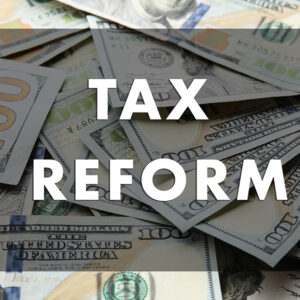It’s one of the rarest policies in Washington politics — a tax increase that Republicans support.
While the D.C. shutdown continues, advocates for U.S. businesses and tax reform are still working to change America’s laws on third-party litigation funding (TPLF).
TPLF is a form of investing for hedge funds and large financial institutions that essentially allows them to bet on lawsuits—in secret and without disclosure—by fronting part of the money. They cover legal costs upfront and, if the plaintiff wins, they win, too. Burford Capital, for example, is on the verge of collecting its massive share of a $16.1 billion court judgment in a single case.
Opponents of TPLF say it adds to the nation’s already litigious culture, driving up costs for American businesses.
Patrick J. Tiberi, president of the Ohio Business Roundtable and a former Republican member of Congress, describes the current TPLF situation as “a Wild West where foreign hedge funds, sovereign wealth funds, and other anonymous investors bankroll lawsuits in U.S. courts — paying legal fees and other expenses — in the hopes of taking a share of the winnings.”
“Their goal is simple: fund the case and collect a cut,” Tiberi said.
Supporters of these investments say they protect the rights of people and small businesses who’ve been wronged and lack the resources to pursue their claims in court.
“Imbalance in the litigation system has permitted well-financed repeat defendants to achieve an inappropriate advantage,” according to the International Legal Finance Association. “Once possessed of such an advantage, holders have a strong desire to retain it. Commercial legal finance levels the playing field and threatens that advantage.”
But the immediate focus of Republicans such as U.S. Sen. Thom Tillis of North Carolina is what they see as unfair tax treatment of the TPLF “winnings.” Those returns on investment should be treated like other business profits, they argue.
Tillis introduced the Tackling Predatory Litigation Funding Act, which would impose a new tax on profits earned by third-party entities that finance civil litigation and curb predatory practices in the litigation funding industry.
“TPLF investment firms are treating the U.S. court system like a casino,” Tillis said when he proposed the legislation.
U.S. Rep. Kevin Hern (R-Okla.), who introduced a companion bill in the House, agreed.
“Foreign entities should not be allowed to meddle, tax-free, in the American legal system,” Hern said. “Frivolous lawsuits have gotten out of control in recent years, largely because of these third-party funders fueling a market that is ballooning.”
The legislation was included in the original version of the One Big Beautiful Bill budget reconciliation, but it was removed in the final hours of debate after the Senate parliamentarian issued a controversial ruling that it was not compliant with budget rules.
Under current law, foreign investors in TPLF cases could pay no U.S. taxes on lawsuit earnings because their payouts were treated as capital gains and exempted under the tax code. Plaintiffs’ and attorneys’ winnings are taxed at the ordinary income rate. The bill would tax these legal winnings from lawsuit funders at the highest individual tax rate (37 percent) plus an additional 3.8 percent surtax, meaning foreign investors would be required to pay U.S. taxes on their litigation-driven profits for the first time.
It’s a tax hike Republicans can love, and nearly 20 conservative organizations have lined up to support closing this litigation tax loophole.
“It raises revenue, which can be used, of course, to offset other tax changes that would lose revenue, but it also is considered to be fair,” said James Carter, who dealt with tax policy in the George W. Bush administration and the first Trump transition.
David Williams, president of the Taxpayers Protection Alliance, supports the reform, too.
“TPLF funders pay a lower tax rate on their portion of a court award than actual plaintiffs, while foreign TPLF ‘investors’ can leverage this tax treatment to avoid any tax obligation from using the U.S. court system to target U.S. companies with lawsuits.”
Advocates for TPLF reform believe that, once the current shutdown is over, there may be enough support to get a stand-alone bill through Congress.
If a second reconciliation bill gets moving, it may contain as many as 200 tax proposals not included in the One Big Beautiful Bill Act. That figure comes from statements made by Senate Finance Committee Chair Mike Crapo (R-Idaho).
That many tax proposals may seem like a lot to debate, but Carter said it remains possible to get something done about TPLF.
“Whenever there is a budget resolution, there’s an opportunity for reconciliation because the budget resolutions include the instructions to the committees that say, ‘Look, we want you to move legislation in your committees to change the numbers to reflect the numbers in this budget resolution,’” Carter said.
“I used to work for the Senate Budget Committee.”


